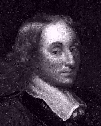Blaise Pascal


Blaise Pascal was born in Clermont-Ferrand (Auvergne - central France) on June 19, 1623. As a brilliant man, Blaise Pascal made important contributions to science, mathematics, and religious philosophy.
In science Pascal studied mainly hydrodynamics, and hydrostatic and atmospheric pressure. This led him to the invention of the syringe and the hydraulic press. He established the principle of hydrostatics now known as Pascal's law.
In mathematics he made a pioneering work in projective geometry, calculus and probability theory. Also his independent discovery of the arithmetical triangle called now "Pascal triangle" is famous. In 1642 he invented the mechanical adding machine called Pascaline.
Pascal died of stomach cancer at the age of 39 (Aug. 19, 1662).
To learn more about the life and work of Blaise Pascal, read related articles in any Encyclopedia (Encarta, Compton's, Grollier) or visit these locations:
Blaise Pascal
(http://www-groups.dcs.st-and.ac.uk/%7Ehistory/Mathematicians/Pascal.html)
A part of the page
Mac Tutor History of Mathematics.
University of St.Andrews, Scotland
Blaise Pascal
(http://www.maths.tcd.ie/pub/HistMath/People/Pascal/RouseBall/RB_Pascal.html)
A page made from the book A Short Account of the History of Mathematics.
Trinity College, Dublin
Have a look at two versions of Pascaline (GIF files 118 + 108 KB) displayed in Musee du Ranquet (Clermont-Ferrand).
Go back to Turbo Pascal
Quit to Home page